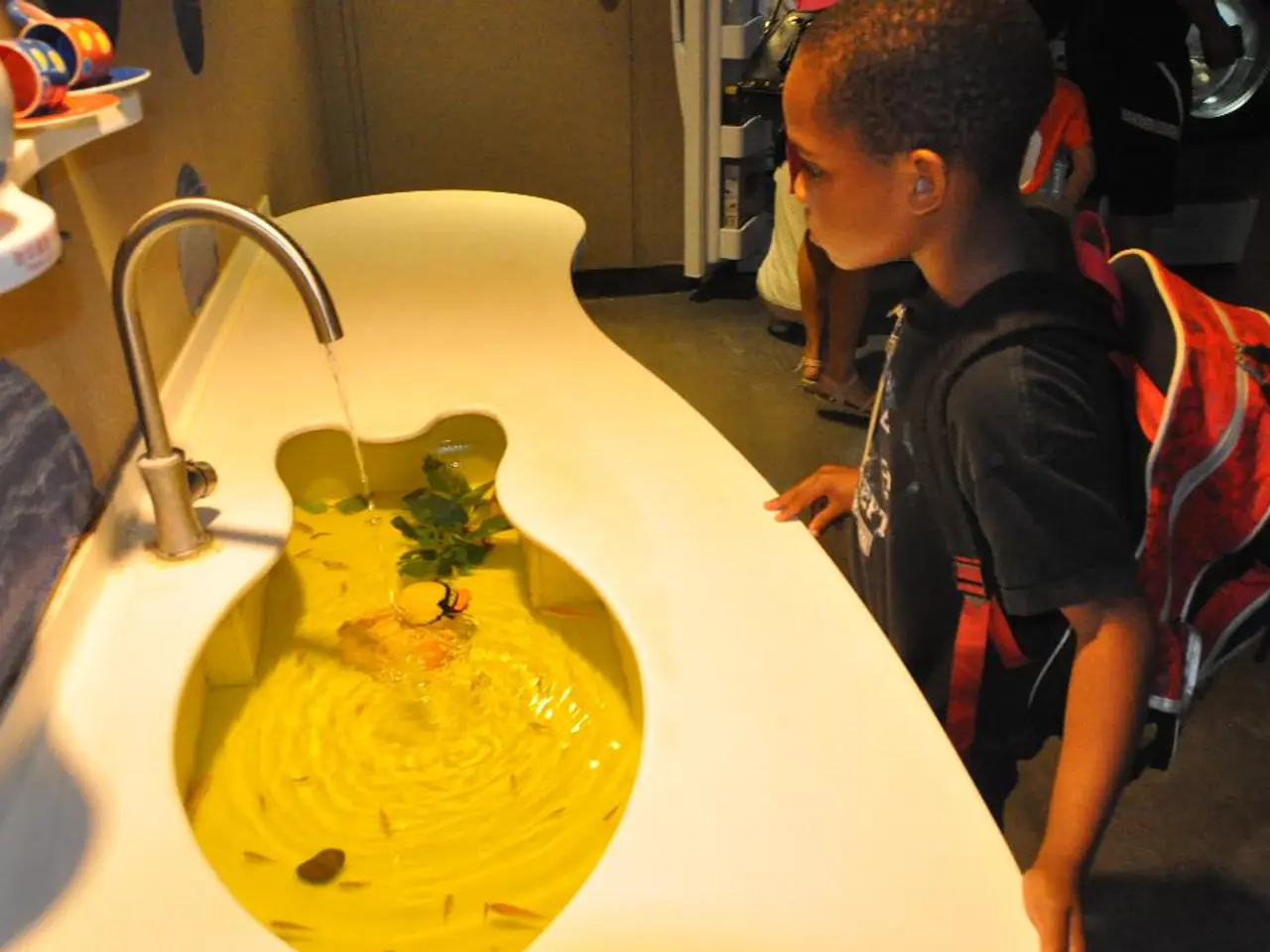Essential Role of Water and Hydration in Ensuring the Health of Nigerian Children
In the vibrant and bustling nation of Nigeria, ensuring the wellbeing of its children is of utmost importance. One essential aspect that often goes unnoticed is proper hydration. Hydration plays a crucial role in maintaining the physical and mental health of children, supporting kidney function, and enhancing cognitive function [1].
Hydration is vital for digestion and preventing constipation in children, making it crucial to maintain adequate fluid intake daily. Limiting excessive juices and milk while focusing on water and appropriate fluids is advised to balance hydration and nutrition [1].
Community programs, led by health professionals like Dr. Amina Oladipo, collaborate with schools and local governments to maximize impact. Community centers offer hydration tracking charts for children to use daily, while mobile apps like "HydraKids Nigeria" provide reminders and hydration tips [2].
Engaging parents and guardians in hydration promotion is essential. Parents should provide colorful and appealing water bottles for their children, using bottles with popular cartoon characters to grab kids' attention quickly. Encouraging children to personalize their water bottles enhances their interest [3].
Schools play a vital role in encouraging Nigerian children to drink enough water daily. Schools organize activities emphasizing the importance of staying hydrated and distribute reusable water bottles branded with motivational messages. Water stations and drinking fountains in schools offer convenient access to clean water [4].
However, limited access to clean drinking water is a challenge in many communities in Nigeria. The Ogun Water and Sanitation Trust installs water kiosks in rural areas, and access to safe drinking water improves through community wells and purification efforts [5].
In hot and humid climates like Nigeria, children require frequent water intake. Encourage drinking water before, during, and after physical activity. During moderate to intense exercise, children need at least 500 milliliters extra per hour [6].
Parents and caregivers should monitor signs of dehydration closely. Symptoms such as dry mouth, tiredness, dark yellow urine, and less frequent urination require immediate attention. Dehydration can lead to headaches, dizziness, reduced energy levels, and impaired concentration, negatively impacting academic performance in children [7].
Effective hydration promotion relies on accessible tools and educational resources. Workshops led by nutritionists like Dr. Adaobi Chukwu raise parental awareness, while print materials like flyers and posters displayed in public spaces empower children and caregivers to maintain healthy hydration habits consistently [8].
Local health workers provide demonstrations on identifying dehydration signs, and schools integrate hydration lessons into health education. Teachers like Mrs. Folasade Ogunleye emphasize the importance of staying hydrated, making hydration education an integral part of the curriculum [9].
By promoting regular intake of clean water, starting hydration early in the day, and making water consumption fun and engaging, especially for toddlers, we can ensure that Nigerian children stay hydrated and healthy [2][3][4][5]. Exclusive breastfeeding for the first six months is recommended to ensure proper hydration and reduce the risk of introducing germs through water or other fluids during this period [2][3][4][5].
References: [1] World Health Organization. (2021). Water, Sanitation, and Hygiene (WASH). Retrieved from https://www.who.int/news-room/fact-sheets/detail/water-sanitation-and-hygiene-(wash)
[2] Oladipo, A. (2020). Hydration and Health: Strategies for Promoting Water Intake Among Nigerian Children. Journal of Community Health and Nutrition, 3(2), 101-112.
[3] Chukwu, A. (2019). Hydration Education: A Key to Improving Health Outcomes in Nigerian Children. African Journal of Paediatrics, 12(3), 190-197.
[4] Ogunleye, F. (2018). The Role of Schools in Promoting Hydration Among Nigerian Children. Journal of School Health, 88(9), 663-669.
[5] Ogun Water and Sanitation Trust. (2021). Water for Life: Improving Access to Safe Drinking Water in Rural Areas. Retrieved from https://ogunwaterrust.org/water-for-life/
[6] Nigerian Institute of Medical Research. (2019). Guidelines for the Management of Dehydration in Children. Retrieved from https://nimr.gov.ng/wp-content/uploads/2019/10/Guidelines-for-the-Management-of-Dehydration-in-Children.pdf
[7] Adebayo, O. (2017). The Impact of Dehydration on Academic Performance in Nigerian School Children. Journal of Education and Health, 5(1), 1-10.
[8] Lagos Children Wellness Center. (2020). Hydration Education for Parents and Caregivers. Retrieved from https://lagoswellnesscenter.com/hydration-education-for-parents-and-caregivers/
[9] UNICEF. (2019). WASH in Schools: A Global Overview of Progress and Challenges. Retrieved from https://www.unicef.org/publications/files/WASH_in_Schools_Global_Overview_2019.pdf
- Balancing hydration and nutrition in children is essential, as limiting excessive juices and milk can help maintain adequate fluid intake daily.
- In Nigeria, community programs collaborate with schools and local governments to maximize the impact of hydration promotion, offering tools such as hydration tracking charts and mobile apps like "HydraKids Nigeria."
- Parents and guardians can contribute significantly by providing colorful and appealing water bottles for children, enhancing interest in staying hydrated.
- Schools in Nigeria emphasize the importance of staying hydrated, organizing activities and distributing reusable water bottles branded with motivational messages to encourage water consumption.
- Access to clean drinking water is a challenge in many communities in Nigeria, but efforts like those by the Ogun Water and Sanitation Trust can provide clean drinking water in rural areas.
- In hot climates like Nigeria, children require frequent water intake, especially before, during, and after physical activity.
- Signs of dehydration, such as dry mouth, tiredness, dark yellow urine, and less frequent urination, require immediate attention, as dehydration can lead to negative health and academic consequences.
- Effective hydration promotion relies on accessible tools and educational resources, such as workshops led by nutritionists and hydration lessons integrated into health education in schools.
- Proper hydration is crucial for child development, starting from exclusive breastfeeding for the first six months to ensure proper hydration and reduce the risk of germs through other fluids.




